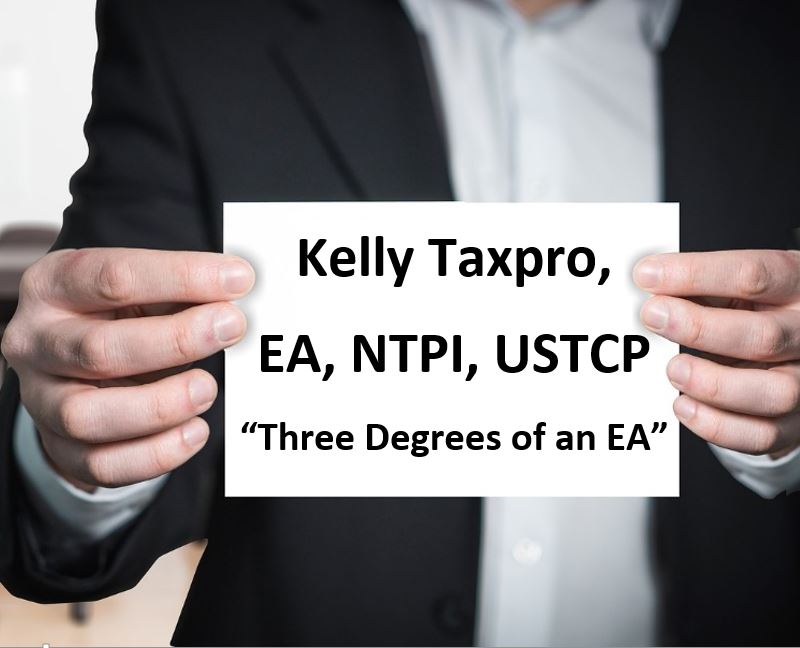
#EnrolledAgent
Three Degrees of Enrolled Agents
What is an Enrolled Agent? There, I got it out first so you will enjoy reading the remainder of this article.
My best elevator version (and an attorney I worked for advised me against using this); “We are non-lawyer Tax Attorney’s.” That at least gets the receivers interested enough to clarify things they do understand; ‘lawyer, tax attorney’? What do you mean by that?
There really isn’t a short version of what exactly an enrolled agent (an EA) is.
Technically speaking, Enrolled Agents have a credential issued by the U.S. Treasury Department (yes issued by the Secretary of the Treasury himself; personally I’d like to think [erroneously so]) which falls under the jurisdiction of the Internal Revenue Service (“hereinafter referred to as the “IRS”).
Here’s what the IRS website says about Enrolled Agents (EA’s): An enrolled agent is a person who has earned the privilege of representing taxpayers before the Internal Revenue Service by either passing a three-part comprehensive IRS test covering individual or business tax returns, or through experience as a former IRS employee. Enrolled agent status is the highest credential the IRS awards. Individuals who obtain this elite status must adhere to ethical standards and complete 72 hours of continuing education courses every three years.
Enrolled agents, like attorneys and certified public accountants (CPAs), have unlimited practice rights. This means they are unrestricted as to which taxpayers they can represent, what types of tax matters they can handle, and which IRS offices they can represent clients before. Learn more about enrolled agents in Treasury Department Circular 230 (PDF).

Enrolled Agent, NTPI Fellow, USTCP
Where’d Everybody Go?
Wow. Love that explanation on the IRS website; especially that part of ‘elite status’. By the time I got to that point everybody has gotten off the elevator many floors ago. I’m wishing that explaining what an enrolled agent is was as simple as saying, “I’m a CPA.” Nobody questions that; everybody knows what a CPA is, right? Probably not; but my hat goes off the AICPA (American Institute of Certified Public Accountants) for a magnificent feat of branding that profession has enjoyed (and fiercely protected, I’ll add). Plus, what’s the follow up question to hearing, “I’m a CPA.”? “Cool, what’s your field of specialization?” I’m thinking most elevator riders wouldn’t know, or even care, to ask that question.
So, often the response to questions about what I do for a living is, “I’m a tax guy.” Or, “I do taxes.” That usually shuts off a conversation as quickly as saying you’re a CPA (just kidding). But for those you are curious, what comes next? “So…. are you an accountant?” And of course I tell them that I’m an EA; which leads to the inevitable, “That’s great …. Now. What’s an EA?” It feels like I’ve already covered this question.

Degrees of EA
People generally not knowing what an Enrolled Agent is, and the education required to maintain the credential is bad enough. What’s worse is that people (prospective clients; let’s call it what it is) are completely unaware there are various degrees, or areas of specialization, that Enrolled Agents can place their focus of expertise.
As an Adjunct Instructor for the State College of Florida SEE Prep Course; a course which assists prospective EA’s with knowledge for the Special Enrollment Examination (SEE); the three wickedly difficult exams of the SEE that must be passed in order to earn the EA credential; I communicate what an enrolled agent is this way.
- Enrolled Agents = Bachelor’s Level
Becoming an EA really only indicates you passed the three exams of the SEE and your federal background check. You hold the credential and can maintain it as long as you complete the required amount of continuing professional education. You should know quite a bit about personal and business tax return preparation and the general rules regarding income, expenses, deductions, credits; code of professional conduct, and the rules-of-the road. You can act on the behalf of others in front of the IRS; but nothing about EA screams of expertise.
Continuing Professional Education (CPE) is where you will maintain, broaden, and refine your knowledge. As your professional life dictates, you’ll focus on the knowledge that will give you the most return on your investment. That could be a focus on business owners, simple individual tax preparation, even IRS conflict resolution. And you can become an expert in any or all of them. Once you become an Enrolled Agent you can focus on any area of tax law you wish. Regardless of the heights you hit, you will still only have EA following your name.
Becoming an Enrolled Agent can allow you to secure gainful employment, at least seasonally, because the tax preparation community of CPA’s, bookkeepers and accountants know what EA’s are and value their credential; it is that community where a large majority of Enrolled Agents find themselves employed.
- NTPI Fellow = Master’s Level
The National Tax Practice Institute Fellow designation, NTPI or NTPI Fellow, is evidence of significant expertise in the representation of taxpayers before the IRS. According to the National Association of Enrolled Agents (NAEA), becoming an NTPI Fellow isn’t easy.
NTPI Fellows have completed another stringent, three-level program of study that covers all facets of representing clients before the IRS and the associated codes, internal regulations and agency structure. These professionals are focused primarily on the ‘IRS collections’ aspect of helping others in conflict with the IRS; and regularly elevate cases to the IRS Office of Appeals.
Like a master’s level education from a university can serve you quite well; having NTPI following the EA after your name shows you made a determined effort, beyond elective continuing professional education, to fully understand how to successful navigate the IRS collections process. The NTPI level of acumen for an EA is extremely useful due to the nature of the U.S. Tax Court pushing back cases to IRS Appeals.
Again, the NTPI Fellow designation is widely recognized by attorneys, accountants, CPA’s, EA’s; basically the entire tax and accounting industry; plus tax resolution / representation companies and lawyers. (The NTPI Fellow designation should not be confused with an Actual Master of Taxation degree from an accredited institution.) As an NTPI Fellow you will be in the company of some of the nation’s top tax practitioners.
- USTCP = Doctorate Level
The United States Tax Court Practitioner (USTCP) says a great deal about your expertise as an Enrolled Agent. To obtain the USTCP designation another extensive four part examination must be passed successfully. This examination focuses on knowledge of these subject areas:
(1) The Tax Court Rules of Practice and Procedure,
(2) Federal Taxation,
(3) The Federal Rules of Evidence, and
(4) Legal ethics, including the Model Rules of Professional Conduct of the American Bar Association.
The four part USTCP exam is handwritten; particularly intimidating for most test takers; however if you are successful as an Enrolled Agent, you will become a non-attorney admitted to practice before the United States Tax Court. You will become a member of the United States Tax Court Bar.
This is where the road of IRS representation splits. EA’s and CPA’s, by-and-large, cannot represent others in front of the tax court. This is a realm primarily for lawyers. Most any lawyer can be admitted to the U.S. Tax Court Bar and call themselves a tax attorney. It is the non-attorneys who have the high hurdle of the four part examination.
Tax court really is about tax law. It is the national forum for resolving disputes between taxpayers and the IRS. When cases are heard in Tax Court, the judges are deciding whether the IRS errored by not following or interpreting the IRS Tax Code correctly. The taxpayer involved has had a petition filed outlining where the taxpayer believes the IRS was mistaken. There are some massively huge tax court cases, but the smaller cases are more numerous and the court has a division for ‘small cases’ where the tax liability is $50,000 or less.

As far as EA’s go, USTCP is the elite of the elite; these individuals really are ‘non-lawyer tax attorneys’; a member of a Bar Association; although NTPI Fellow is nothing to turn your nose up at; nor EA, for that matter.
At times you will see an Enrolled Agent with all three designations: EA, NTPIF, USTCP; this is the trifecta of knowledge for an EA. All three designations, representing years of study, numerous examinations, untold hours of continuing professional education, and a commitment to ethical behavior and ongoing personal growth.
Enrolled Agents are tax experts; 100% of an EA’s education is related to federal tax law and that competence must be displayed to the Internal Revenue Service on a continual basis.
If you seek the help of an Enrolled Agent (EA) click here.
Watch this video here: https://youtu.be/C1iO-SQXnqU


